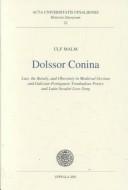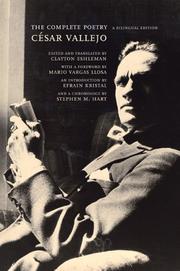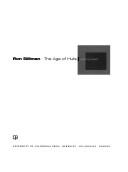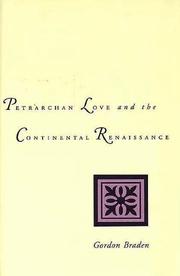Book
ISBN: 3533027325 3533038572 3533028380 3533027333 3533029301 3533029697 3533041476 Year: 1979 Volume: 2 Publisher: Heidelberg Winter
Abstract | Keywords | Export | Availability | Bookmark
 Loading...
Loading...Choose an application
- Reference Manager
- EndNote
- RefWorks (Direct export to RefWorks)
Romance literature --- anno 1200-1499 --- Romance poetry --- -Romance poetry --- Romance-language literature --- History and criticism --- Poetry, Medieval --- History and criticism. --- Poetry --- anno 500-1199 --- Romance-language poetry --- Poésie médiévale --- Poésie romane --- Histoire et critique --- Portuguese literature --- -History and criticism
Book
ISBN: 0823290328 0823287971 082328798X 0823287963 9780823287970 9780823287994 0823287998 9780823290321 9780823287987 9780823287963 Year: 2020 Publisher: New York, NY
Abstract | Keywords | Export | Availability | Bookmark
 Loading...
Loading...Choose an application
- Reference Manager
- EndNote
- RefWorks (Direct export to RefWorks)
'Dictionary Poetics' analyses book-length poems from a number of writers who have used particular editions of specific dictionaries to structure their work. The authors include Louis Zukofsky, George Oppen, Clark Coolidge, Bernadette Mayer, Tina Darragh, and Harryette Mullen.
American poetry --- English language --- Poetics. --- Creation (Literary, artistic, etc.) --- Creative ability in art --- Creative ability in literature --- Art --- Imagination --- Inspiration --- Literature --- Creative ability --- Originality --- Poetry --- American literature --- History and criticism. --- Lexicography. --- Technique --- Dictionaries --- History and criticism --- Clark Coolidge. --- Dictionaries. --- George Oppen. --- Harryette Mullen. --- Language Poetry. --- Louis Zukofsky. --- Objectivism. --- Tina Darragh. --- Germanic languages
Book
ISBN: 9780888442277 0888442270 9781771104197 Year: 2022 Publisher: Toronto Pontifical Institute of Mediaeval Studies
Abstract | Keywords | Export | Availability | Bookmark
 Loading...
Loading...Choose an application
- Reference Manager
- EndNote
- RefWorks (Direct export to RefWorks)
Oltre la mer salee' collects revised versions of twenty-eight papers in English, French, Italian, and Spanish originally presented during the 21st International Congress of the Société Rencesvals pour l?étude des épopées romanes. It includes studies by an international group of specialists in medieval vernacular epic, divided among four major themes: family relations, manuscripts, French epic in England, and travel and exchanges. Their work covers a variety of Old French and Old Occitan epics, as well as adaptations and related texts in Italian, Castilian, Brasilian Portuguese, English, and Greek. It also includes reflections on the interactions between Romance epic, the Latin language, and even the fine arts. This volume convincingly demonstrates one of the key elements of the enduring appeal of medieval Romance epic: its astonishingly international quality, both in the Middle Ages and today.
Chansons de geste --- Epic poetry, Romance-language --- Families in literature --- Intercultural communication in literature --- 82-31 --- 82-31 Roman --- Roman --- Family in literature --- Epic poetry, Romance --- Romance-language epic poetry --- Romance-language poetry --- Epic poetry --- French poetry --- Legends --- Heldensage --- History and criticism

ISBN: 9155450598 9789155450595 Year: 2001 Volume: 22 Publisher: Uppsala Uppsala university library
Abstract | Keywords | Export | Availability | Bookmark
 Loading...
Loading...Choose an application
- Reference Manager
- EndNote
- RefWorks (Direct export to RefWorks)
Love in literature. --- Sex in literature. --- Poetry, Medieval --- Bawdy poetry, Romance --- Love poetry, Romance --- History and criticism. --- Love in literature --- Sex in literature --- Romance-language love poetry --- Romance-language poetry --- Romance-language bawdy poetry --- History and criticism --- Bawdy poetry --- Occitan poetry --- To 1500 --- Portuguese poetry --- Love poetry Latin (Medieval and modern) --- Poetry, Medieval - History and criticism. --- Bawdy poetry, Romance - History and criticism. --- Love poetry, Romance - History and criticism. --- Lyrique medievale galicienne --- Poesie lyrique occitane --- Troubadours
Book
ISBN: 3319627228 331962721X Year: 2017 Publisher: Cham : Springer International Publishing : Imprint: Palgrave Macmillan,
Abstract | Keywords | Export | Availability | Bookmark
 Loading...
Loading...Choose an application
- Reference Manager
- EndNote
- RefWorks (Direct export to RefWorks)
This study offers a comprehensive examination of the work of the young poet and scholar, Veronica Forrest-Thomson (1947-1975) in the context of a literary-critical revolution of the late sixties and seventies and evaluates her work against contemporary debates in poetry and poetics. Gareth Farmer explores Forrest-Thomson’s relationship to the conflicting models of literary criticism in the twentieth century such as the close-reading models of F.R Leavis and William Empson, postructuralist models, and the work of Ludwig Wittgenstein. Written by the leading scholar on Forrest-Thomson’s work, this study explores Forrest-Thomson’s published work as well as unpublished materials from the Veronica Forrest-Thomson Archive. Drawing on close readings of Forrest-Thomson’s writings, this study argues that her work enables us reevaluate literary-critical history and suggests new paradigms for the literary aesthetics and poetics of the future.
Literature. --- Literature, Modern --- Poetry. --- British literature. --- Poetry and Poetics. --- Twentieth-Century Literature. --- Contemporary Literature. --- British and Irish Literature. --- Literature --- Belles-lettres --- Western literature (Western countries) --- World literature --- Poems --- Poetry --- Verses (Poetry) --- 20th century. --- 21st century. --- Philosophy --- Philology --- Authors --- Authorship --- Language poetry --- History and criticism. --- Forrest-Thomson, Veronica --- Criticism and interpretation. --- Forrest-Thompson, Veronica --- Thomson, Veronica Forrest --- -Thompson, Veronica Forrest --- -Forrest, Veronica --- Literature, Modern-20th century. --- Literature, Modern—20th century. --- Literature, Modern—21st century. --- European literature. --- European Literature. --- European literature

ISBN: 1282358812 9786612358814 0520932145 9780520932142 9781282358812 9780520245525 0520245520 9780520261730 0520261739 6612358815 Year: 2007 Publisher: Berkeley University of California Press
Abstract | Keywords | Export | Availability | Bookmark
 Loading...
Loading...Choose an application
- Reference Manager
- EndNote
- RefWorks (Direct export to RefWorks)
This first translation of the complete poetry of Peruvian César Vallejo (1892-1938) makes available to English speakers one of the greatest achievements of twentieth-century world poetry. Handsomely presented in facing-page Spanish and English, this volume, translated by National Book Award winner Clayton Eshleman, includes the groundbreaking collections The Black Heralds (1918), Trilce (1922), Human Poems (1939), and Spain, Take This Cup from Me (1939). Vallejo's poetry takes the Spanish language to an unprecedented level of emotional rawness and stretches its grammatical possibilities. Striking against theology with the very rhetoric of the Christian faith, Vallejo's is a tragic vision-perhaps the only one in the canon of Spanish-language literature-in which salvation and sin are one and the same. This edition includes notes on the translation and a fascinating translation memoir that traces Eshleman's long relationship with Vallejo's poetry. An introduction and chronology provide further insights into Vallejo's life and work.
POETRY / General. --- Vallejo, César, --- Vallejo Mendoza, César Abraham, --- Mendoza, César Abraham Vallejo, --- Vallejo, César Abraham, --- Valʹekho, Sesar, --- Valliecho, Kaisar, --- Vallejo, Cholo, --- 20th century poetry. --- award winner. --- christian. --- christianity. --- collected works. --- creative writing. --- emotional. --- faith. --- life story. --- mfa. --- national book award. --- peruvian poetry. --- poetics. --- poetry collection. --- poetry studies. --- poetry translation. --- poetry. --- realistic. --- spanish language poetry. --- spanish language. --- theology. --- translation. --- true story. --- world poetry.

ISBN: 1282360140 9786612360145 0520940423 9780520940420 9780520250147 0520250141 9780520250161 0520250168 Year: 2007 Publisher: Berkeley University of California Press
Abstract | Keywords | Export | Availability | Bookmark
 Loading...
Loading...Choose an application
- Reference Manager
- EndNote
- RefWorks (Direct export to RefWorks)
Between the Age of Innocence and the Age of Experience comes The Age of Huts. This book brings together for the first time all of the poems in Ron Silliman's Age of Huts cycle, including Ketjak, Sunset Debris, The Chinese Notebook, and 2197, as well as two key satellite texts, Sitting Up, Standing, Taking Steps, and BART. Each poem offers a radically different approach toward using language to explore the world. One of the founding works of Language Poetry, The Age of Huts is about everything, more or less literally, as each sentence, even each phrase, embarks on its own narrative, linking together to form a large polyphonic investigation of contemporary life. From Ketjak, one of the first poems to employ "the new sentence," to 2197, a serial work that scrambles the vocabulary and grammar of its sentences, The Age of Huts questions everything we have known about poetry in order to see the world anew.
American poetry. --- American literature --- 20th century american poetry. --- 2197. --- 21st century american poetry. --- age of huts cycle. --- american poet. --- american poetry. --- avant garde poetry. --- bart. --- bringing meaning out of work. --- contemporary life. --- disjunction. --- how to see the world. --- ketjak. --- language poetry. --- materiality. --- poems. --- poetics. --- poetry collection. --- poetry. --- polyphonic investigation. --- prose poetry. --- role of the reader. --- sitting up standing taking steps. --- sunset debris. --- the chinese notebook. --- the new sentence. --- united states poetry. --- vocabulary and grammar.

ISBN: 0300076215 Year: 1999 Publisher: New Haven (Conn.) Yale university
Abstract | Keywords | Export | Availability | Bookmark
 Loading...
Loading...Choose an application
- Reference Manager
- EndNote
- RefWorks (Direct export to RefWorks)
European poetry --- Love poetry, European --- Love poetry, Romance --- History and criticism. --- History and criticism --- Romance-language love poetry --- Romance-language poetry --- European love poetry --- Petrarca, Francesco, --- Pétrarque --- Petrarch --- Petracco, Francesco --- Petrarca, Francesco (1304-1374) --- Influence. --- Petrarca, Francesco --- Love poetry [European ] --- 1450-1600 (Renaissance) --- Love poetry [Romance ] --- Influence --- Petrarca, Francesco, - 1304-1374. - Rime. --- Petrarca, Francesco, - 1304-1374 - Influence. --- Love poetry, European - History and criticism. --- European poetry - Renaissance, 1450-1600 - History and criticism. --- Love poetry, Romance - History and criticism. --- Petrarca, Franciscus, --- Petrarch, --- Petrarch, Francesco, --- Petrarcha, Franciscus, --- Petrark, --- Petrarka, Franchesko, --- Peṭrarḳa, Frants'esḳo, --- Pétrarque, --- Петрарка, Франческо, --- פטררקא, פרנצ׳סקו
Book
ISBN: 8460076946 Year: 1991 Publisher: Madrid Universidad Complutense de Madrid. Facultad de Filologiá
Abstract | Keywords | Export | Availability | Bookmark
 Loading...
Loading...Choose an application
- Reference Manager
- EndNote
- RefWorks (Direct export to RefWorks)
Arabic poetry --- Hebrew poetry --- Romance poetry --- Poésie arabe --- Poésie hébraïque --- Poésie romane --- History and criticism --- Congresses --- Histoire et critique --- Congrès --- Muwashshah --- -Muwashshah, Hebrew --- -Arabic poetry --- -Hebrew poetry, Medieval --- -Spanish poetry --- -Medieval Hebrew poetry --- Arabic literature --- Spanish literature --- Hebrew muwashshah --- Muṿashaḥ --- Jarchas --- Jaryas --- Kharjas --- Markaz --- Tawshīh --- Mozarabic poetry --- -Congresses --- -History and criticism --- Romance-language poetry --- Poésie arabe --- Poésie hébraïque --- Poésie romane --- Congresses. --- Congrès --- Hebrew poetry, Medieval --- Muwashshah, Hebrew --- Spanish poetry --- Medieval Hebrew poetry --- History and criticism&delete&
Book
ISBN: 1282964526 9786612964527 1400836522 9781400836529 9780691144832 0691144834 9780691148663 069114866X Year: 2011 Publisher: Princeton, NJ
Abstract | Keywords | Export | Availability | Bookmark
 Loading...
Loading...Choose an application
- Reference Manager
- EndNote
- RefWorks (Direct export to RefWorks)
"Because I am not silent," George Oppen wrote, "the poems are bad." What does it mean for the goodness of an art to depend upon its disappearance? In Being Numerous, Oren Izenberg offers a new way to understand the divisions that organize twentieth-century poetry. He argues that the most important conflict is not between styles or aesthetic politics, but between poets who seek to preserve or produce the incommensurable particularity of experience by making powerful objects, and poets whose radical commitment to abstract personhood seems altogether incompatible with experience--and with poems. Reading across the apparent gulf that separates traditional and avant-garde poets, Izenberg reveals the common philosophical urgency that lies behind diverse forms of poetic difficulty--from Yeats's esoteric symbolism and Oppen's minimalism and silence to O'Hara's joyful slightness and the Language poets' rejection of traditional aesthetic satisfactions. For these poets, what begins as a practical question about the conduct of literary life--what distinguishes a poet or group of poets?--ends up as an ontological inquiry about social life: What is a person and how is a community possible? In the face of the violence and dislocation of the twentieth century, these poets resist their will to mastery, shy away from the sensual richness of their strongest work, and undermine the particularity of their imaginative and moral visions--all in an effort to allow personhood itself to emerge as an undeniable fact making an unrefusable claim.
Poetry, modern --- Modern poetry --- Poetry --- History and criticism --- Theory, etc. --- Poetry, Modern --- A. R. Ammons. --- Anglo-American poetry. --- Bob Perelman. --- Discrete Series. --- Frank O'Hara. --- George Oppen. --- Language poetry. --- Leningrad. --- Robinson Crusoe. --- The Materials. --- William Butler Yeats. --- aesthetics. --- collective intention. --- collectivity. --- completeness. --- conversation. --- counterfactual identity. --- cultural determinism. --- ethics. --- eugenics. --- freedom. --- grammaticality. --- inattention. --- interpretation. --- judgment. --- literary life. --- love. --- minimalism. --- particularity. --- perfection. --- person. --- personhood. --- poem. --- poet. --- poetic agency. --- poetic community. --- poetic difficulty. --- poetic knowledge. --- poetic mastery. --- poetic politics. --- poetry. --- preference. --- reading. --- silence. --- slightness. --- social life. --- social recognition. --- symbolism. --- translation.

 Search
Search Feedback
Feedback About UniCat
About UniCat  Help
Help News
News